
data-prep-kit
Open source project for data preparation for GenAI applications
Stars: 898
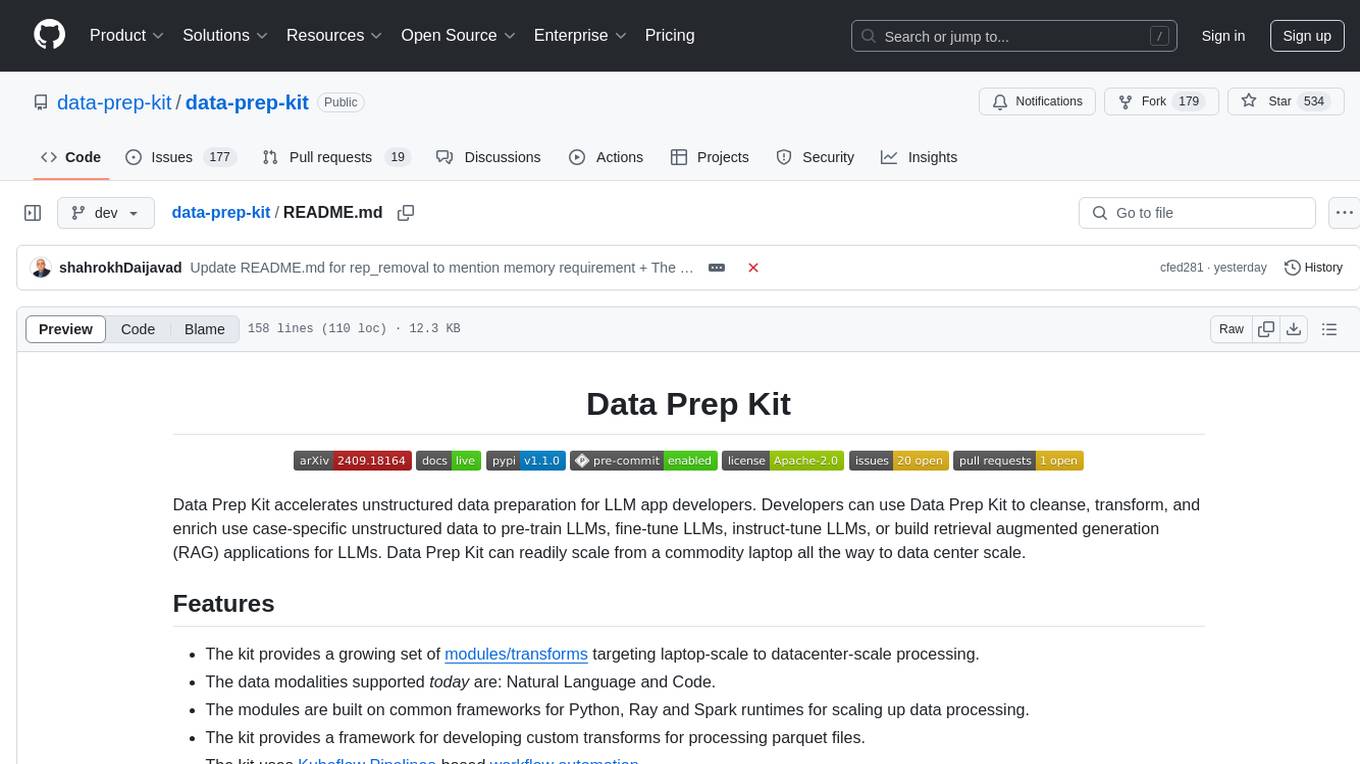
Data Prep Kit accelerates unstructured data preparation for LLM app developers. It allows developers to cleanse, transform, and enrich unstructured data for pre-training, fine-tuning, instruct-tuning LLMs, or building RAG applications. The kit provides modules for Python, Ray, and Spark runtimes, supporting Natural Language and Code data modalities. It offers a framework for custom transforms and uses Kubeflow Pipelines for workflow automation. Users can install the kit via PyPi and access a variety of transforms for data processing pipelines.
README:
Data Prep Kit accelerates unstructured data preparation for LLM app developers. Developers can use Data Prep Kit to cleanse, transform, and enrich use case-specific unstructured data to pre-train LLMs, fine-tune LLMs, instruct-tune LLMs, or build Retrieval Augmented Generation (RAG) applications for LLMs
Data Prep Kit can readily scale from a commodity laptop all the way to data center scale.
- The kit provides a growing set of modules/transforms targeting laptop-scale to datacenter-scale processing.
- The data modalities supported today are: Natural Language, Code, and Image.
- The modules are built on common frameworks for Python and Ray runtimes for scaling up data processing.
- The kit provides a framework for developing custom transforms for processing Parquet files as well as ZIP, NDJSON, and JSONL file formats.
- The kit provides examples of how a single transform can be deployed on Kubernetes clusters as a Python or a Ray job. Additionally, when multiple transforms are deployed in a sequence, the kit uses Tekton pipelines.
The latest version of the Data Prep Kit is available on PyPi for Python 3.10, 3.11, 3.12, and 3.13. It can be installed using:
pip install uv
uv pip install 'data-prep-toolkit-transforms[all]'This will install all available transforms.
For guidance on creating the virtual environment for installing the data prep kit, click here.
With no setup necessary, let's use a Google Colab friendly notebook to try Data Prep Kit. This is a simple transform to extract content from PDF files: examples/notebooks/Run_your_first_transform_colab.ipynb | . (Here are some tips for running Data Prep Kit transforms on Google Colab. For this simple example, these tips are either already taken care of, or are not needed.) The same notebook can be downloaded and run on the local machine, without cloning the repo or any other setup.
Now that you have run a single transform, the next step is to explore how to put these transforms together to run a data prep pipeline for end to end real enterprise use cases like fine-tuning a model or building a RAG application.
We have a complete set of data processing recipes for such use cases.
We also have a developer tutorial for contributing a new transform to the kit.
For advanced users, here is more information for adding your own transform, running transforms from the command line, scaling and automation and more. Also, repository structure and use are discussed here.
All the transforms in the kit include small sample data files for testing, but advanced users who want to download real data files from HuggingFace and use them in testing, can refer to this.
The matrix below shows the the combination of modules and supported runtimes. All the modules can be accessed here and can be combined to form data processing pipelines, as shown in the examples folder.
DPK uses a unified logger - dpk. It can be configured, by setting the following environment variables
| Variable name | Default value | Description |
|---|---|---|
| DPK_LOG_LEVEL | INFO | The loggger level |
| DPK_LOG_FILE | None | The path to the log file, if set the log message will be stored in the file |
| DPK_LOG_JSON_HANDLER | "" | If set to any value of "true", "1", "yes", or "on" (case insensitive) the console logs will be in JSON format |
| DPK_LOG_PROPAGATION | "" | If set to any value of "true", "1", "yes", or "on" (case insensitive), the logger will propagate all log messages to its parent logger |
Contributors are welcome to add new modules to expand to other data modalities as well as add runtime support for existing modules! Please read this for details.
Please feel free to connect with us using the discussion section.
For a list of current maintainers, please see.
For the history of releases and changes, please see.
Papers, talks, presentations and tutorials
Granite open source LLM models
If you use Data Prep Kit in your research, please cite our paper:
@misc{wood2024dataprepkitgettingdataready,
title={Data-Prep-Kit: getting your data ready for LLM application development},
author={David Wood and Boris Lublinsky and Alexy Roytman and Shivdeep Singh
and Constantin Adam and Abdulhamid Adebayo and Sungeun An and Yuan Chi Chang
and Xuan-Hong Dang and Nirmit Desai and Michele Dolfi and Hajar Emami-Gohari
and Revital Eres and Takuya Goto and Dhiraj Joshi and Yan Koyfman
and Mohammad Nassar and Hima Patel and Paramesvaran Selvam and Yousaf Shah
and Saptha Surendran and Daiki Tsuzuku and Petros Zerfos and Shahrokh Daijavad},
year={2024},
eprint={2409.18164},
archivePrefix={arXiv},
primaryClass={cs.AI},
url={https://arxiv.org/abs/2409.18164},
}All source files must include a Copyright and License header. If you would like to see the detailed LICENSE click here.
Data Prep Kit is hosted as a project in the LF AI & Data Foundation.
The project was started by the Data for AI Models team at IBM Research.
Copyright © Data Prep Kit Framework - a Series of LF Projects, LLC.
For Tasks:
Click tags to check more tools for each tasksFor Jobs:
Alternative AI tools for data-prep-kit
Similar Open Source Tools

data-prep-kit
Data Prep Kit accelerates unstructured data preparation for LLM app developers. It allows developers to cleanse, transform, and enrich unstructured data for pre-training, fine-tuning, instruct-tuning LLMs, or building RAG applications. The kit provides modules for Python, Ray, and Spark runtimes, supporting Natural Language and Code data modalities. It offers a framework for custom transforms and uses Kubeflow Pipelines for workflow automation. Users can install the kit via PyPi and access a variety of transforms for data processing pipelines.
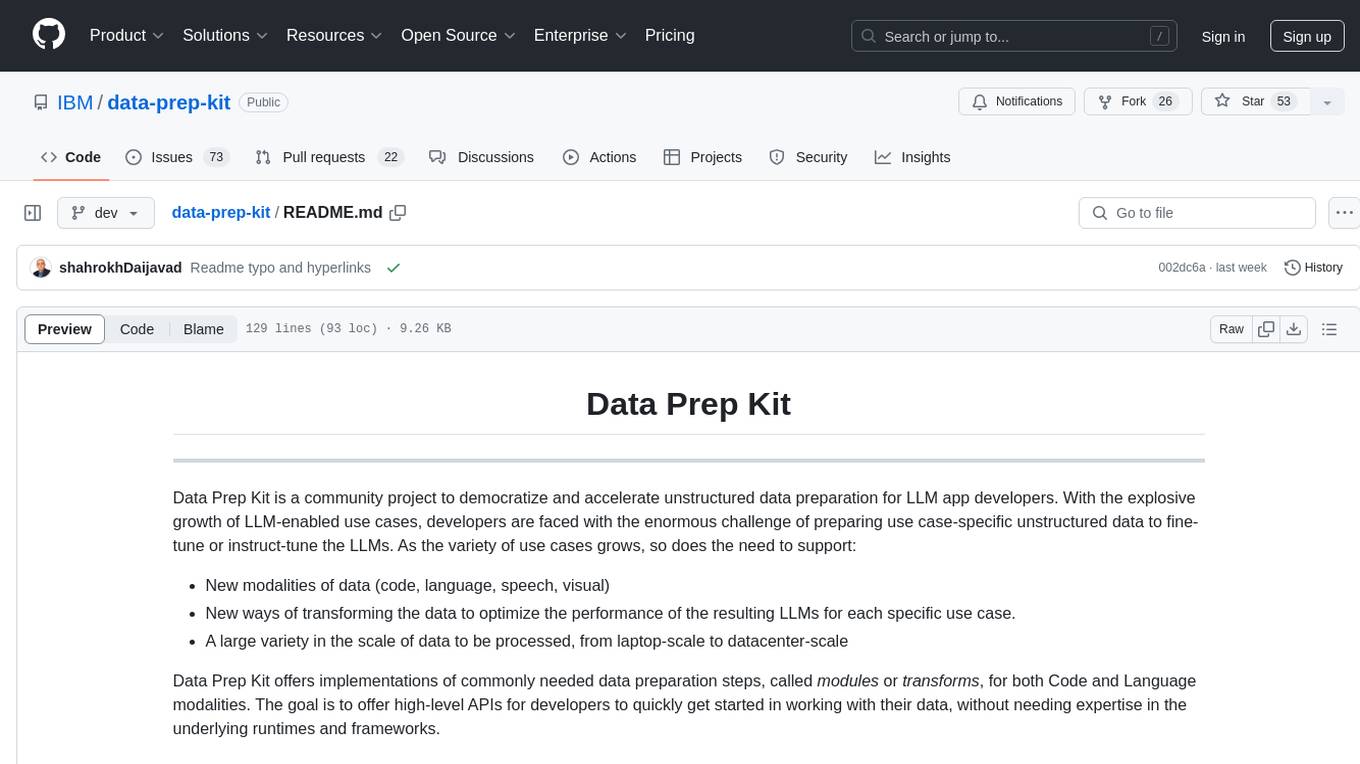
data-prep-kit
Data Prep Kit is a community project aimed at democratizing and speeding up unstructured data preparation for LLM app developers. It provides high-level APIs and modules for transforming data (code, language, speech, visual) to optimize LLM performance across different use cases. The toolkit supports Python, Ray, Spark, and Kubeflow Pipelines runtimes, offering scalability from laptop to datacenter-scale processing. Developers can contribute new custom modules and leverage the data processing library for building data pipelines. Automation features include workflow automation with Kubeflow Pipelines for transform execution.
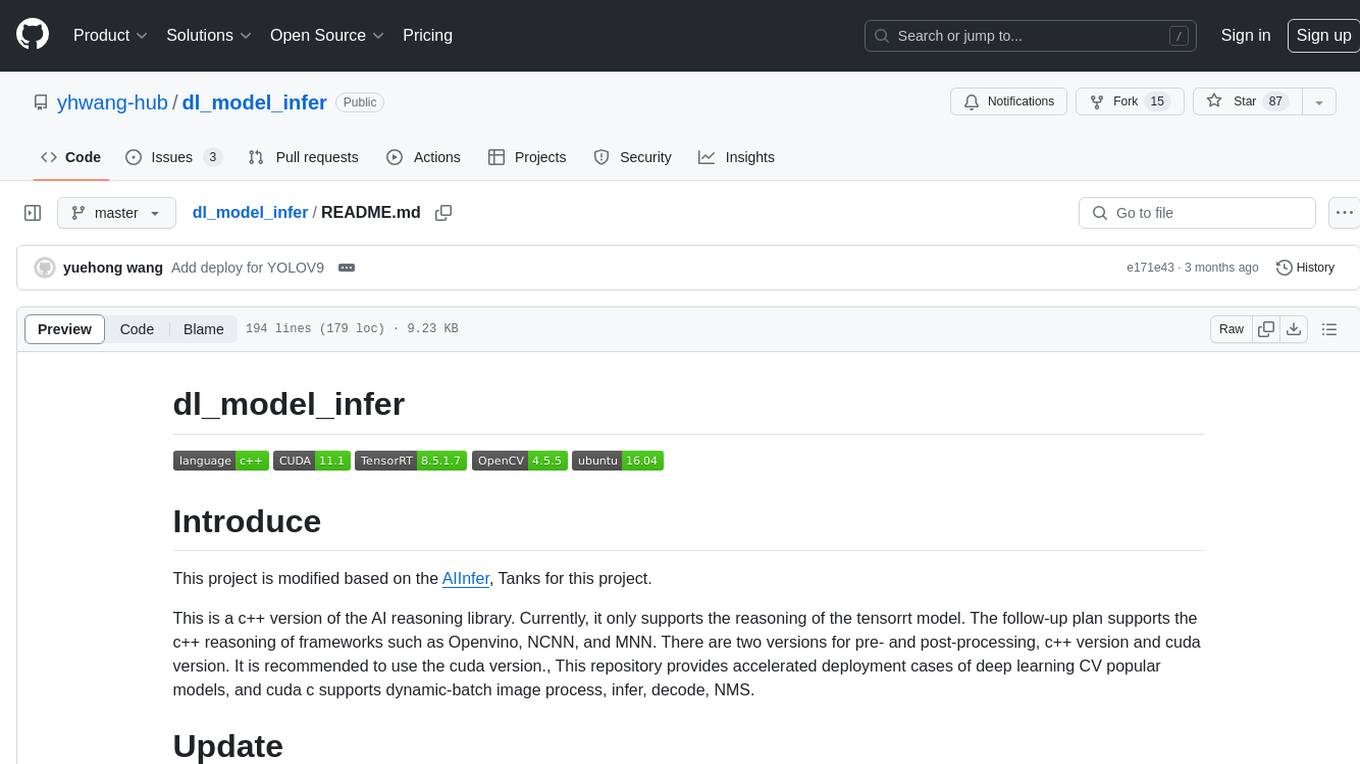
dl_model_infer
This project is a c++ version of the AI reasoning library that supports the reasoning of tensorrt models. It provides accelerated deployment cases of deep learning CV popular models and supports dynamic-batch image processing, inference, decode, and NMS. The project has been updated with various models and provides tutorials for model exports. It also includes a producer-consumer inference model for specific tasks. The project directory includes implementations for model inference applications, backend reasoning classes, post-processing, pre-processing, and target detection and tracking. Speed tests have been conducted on various models, and onnx downloads are available for different models.
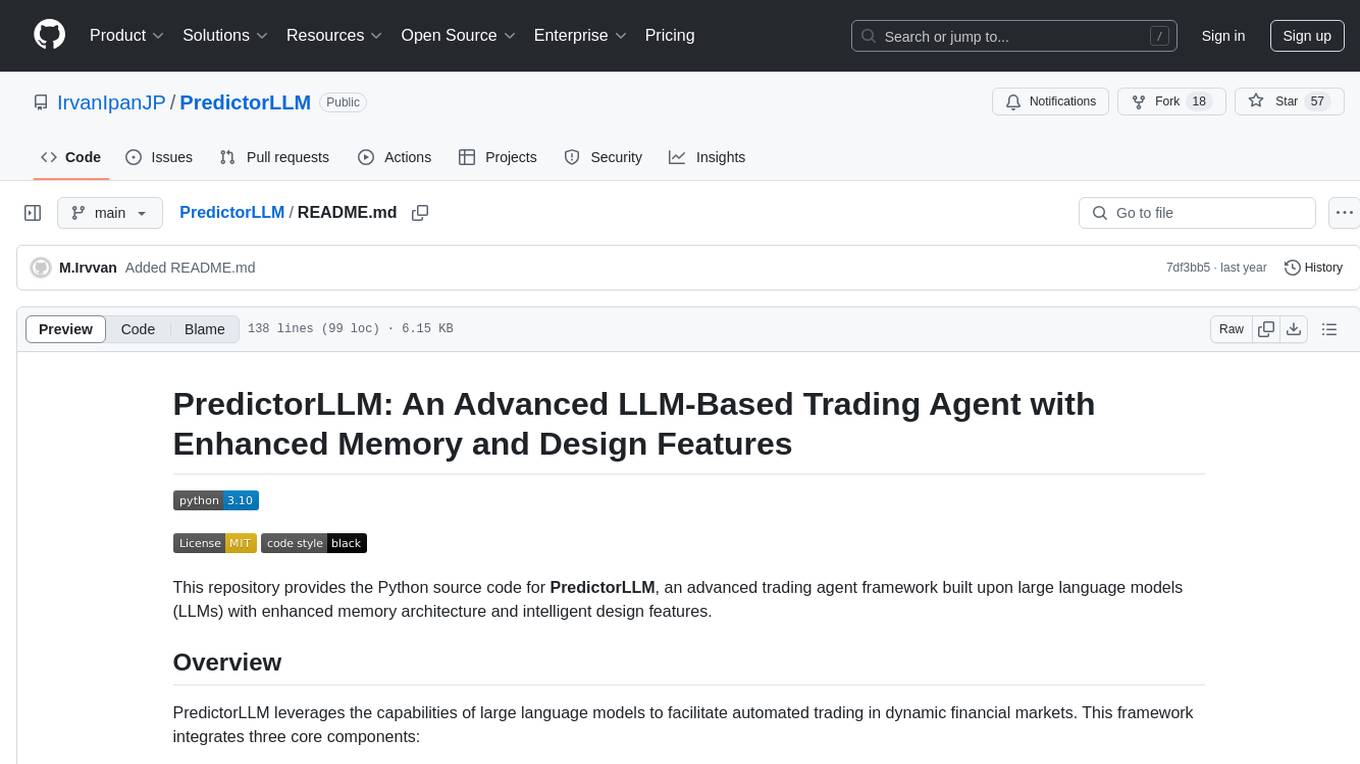
PredictorLLM
PredictorLLM is an advanced trading agent framework that utilizes large language models to automate trading in financial markets. It includes a profiling module to establish agent characteristics, a layered memory module for retaining and prioritizing financial data, and a decision-making module to convert insights into trading strategies. The framework mimics professional traders' behavior, surpassing human limitations in data processing and continuously evolving to adapt to market conditions for superior investment outcomes.
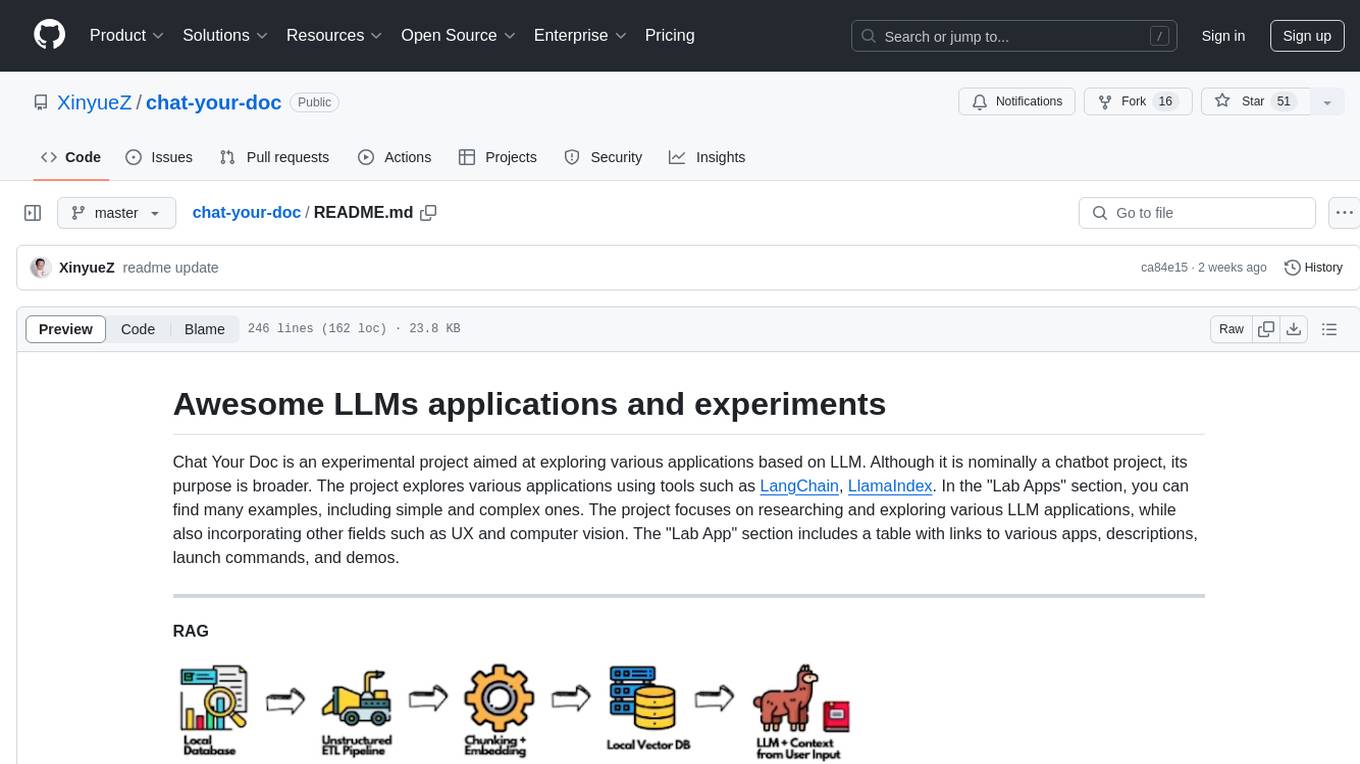
chat-your-doc
Chat Your Doc is an experimental project exploring various applications based on LLM technology. It goes beyond being just a chatbot project, focusing on researching LLM applications using tools like LangChain and LlamaIndex. The project delves into UX, computer vision, and offers a range of examples in the 'Lab Apps' section. It includes links to different apps, descriptions, launch commands, and demos, aiming to showcase the versatility and potential of LLM applications.
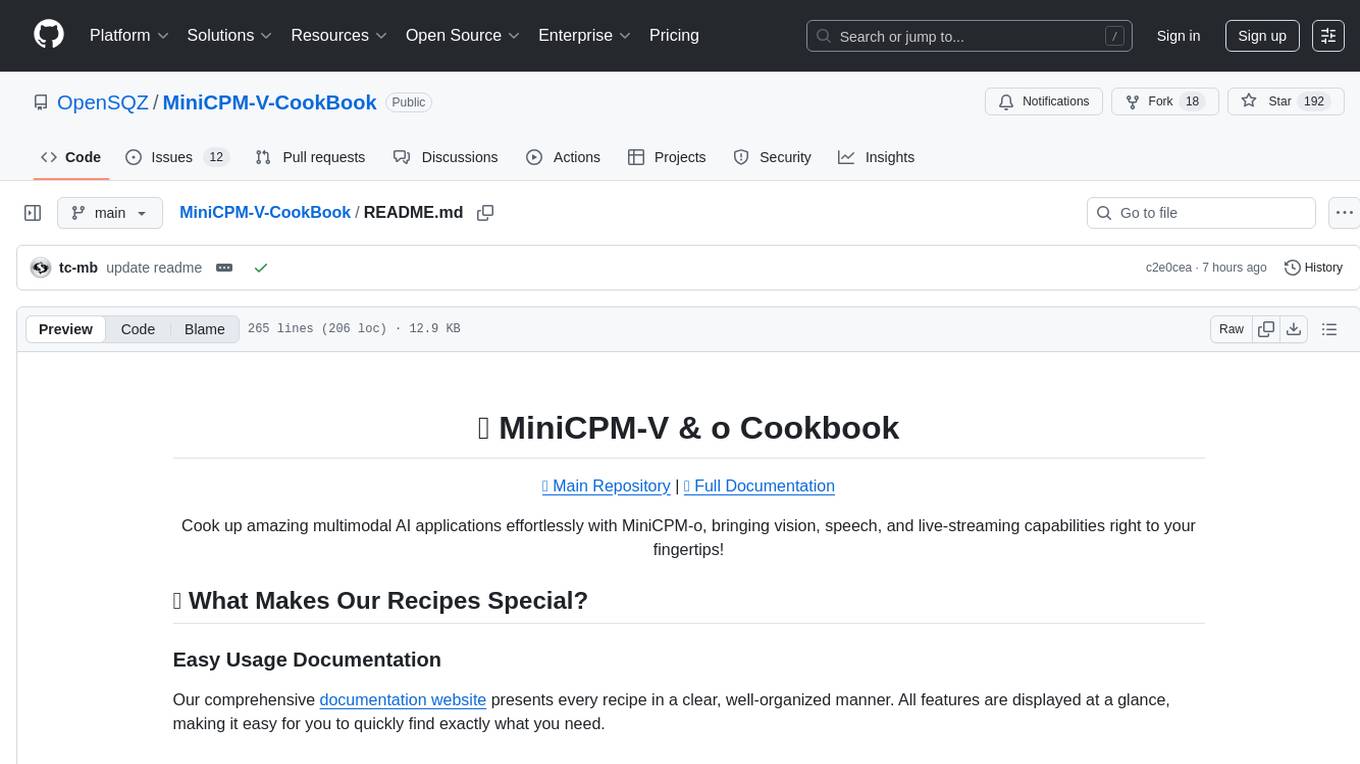
MiniCPM-V-CookBook
MiniCPM-V & o Cookbook is a comprehensive repository for building multimodal AI applications effortlessly. It provides easy-to-use documentation, supports a wide range of users, and offers versatile deployment scenarios. The repository includes live demonstrations, inference recipes for vision and audio capabilities, fine-tuning recipes, serving recipes, quantization recipes, and a framework support matrix. Users can customize models, deploy them efficiently, and compress models to improve efficiency. The repository also showcases awesome works using MiniCPM-V & o and encourages community contributions.
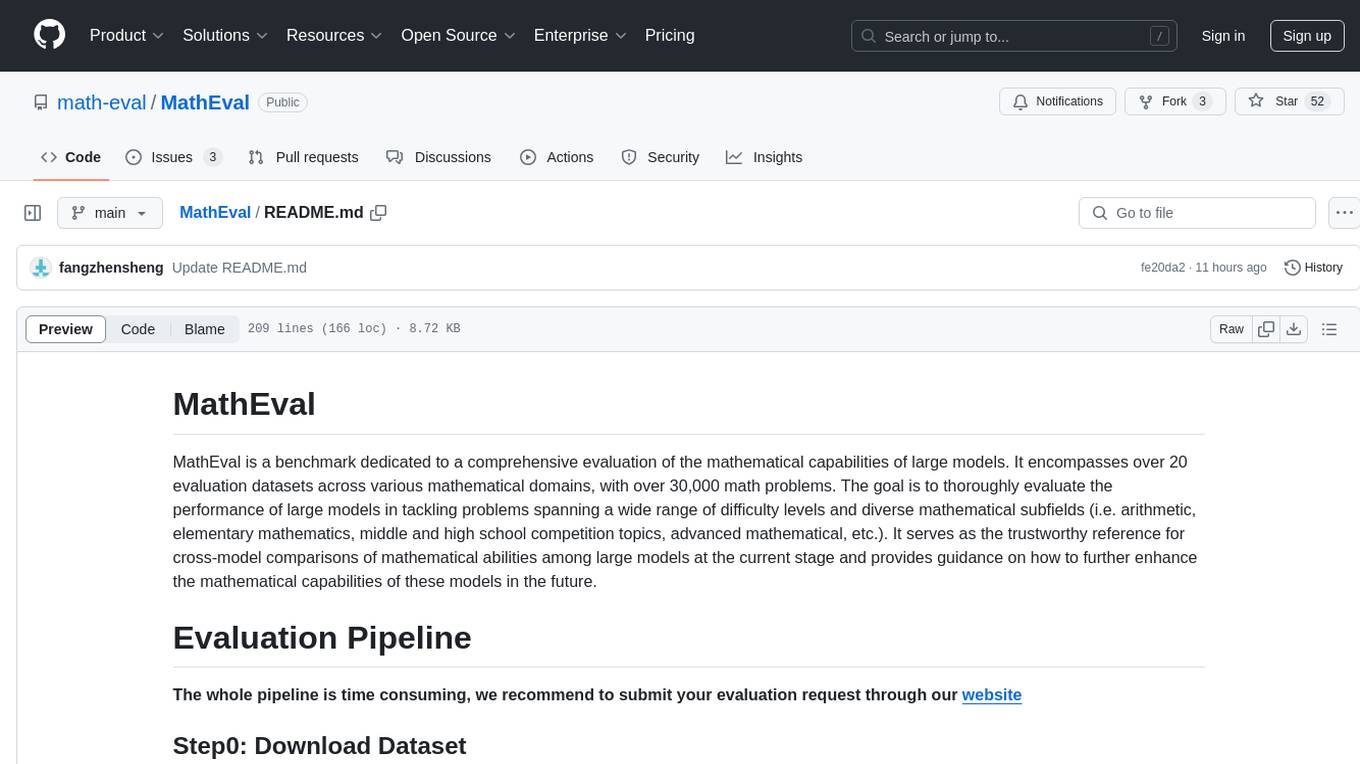
MathEval
MathEval is a benchmark designed for evaluating the mathematical capabilities of large models. It includes over 20 evaluation datasets covering various mathematical domains with more than 30,000 math problems. The goal is to assess the performance of large models across different difficulty levels and mathematical subfields. MathEval serves as a reliable reference for comparing mathematical abilities among large models and offers guidance on enhancing their mathematical capabilities in the future.
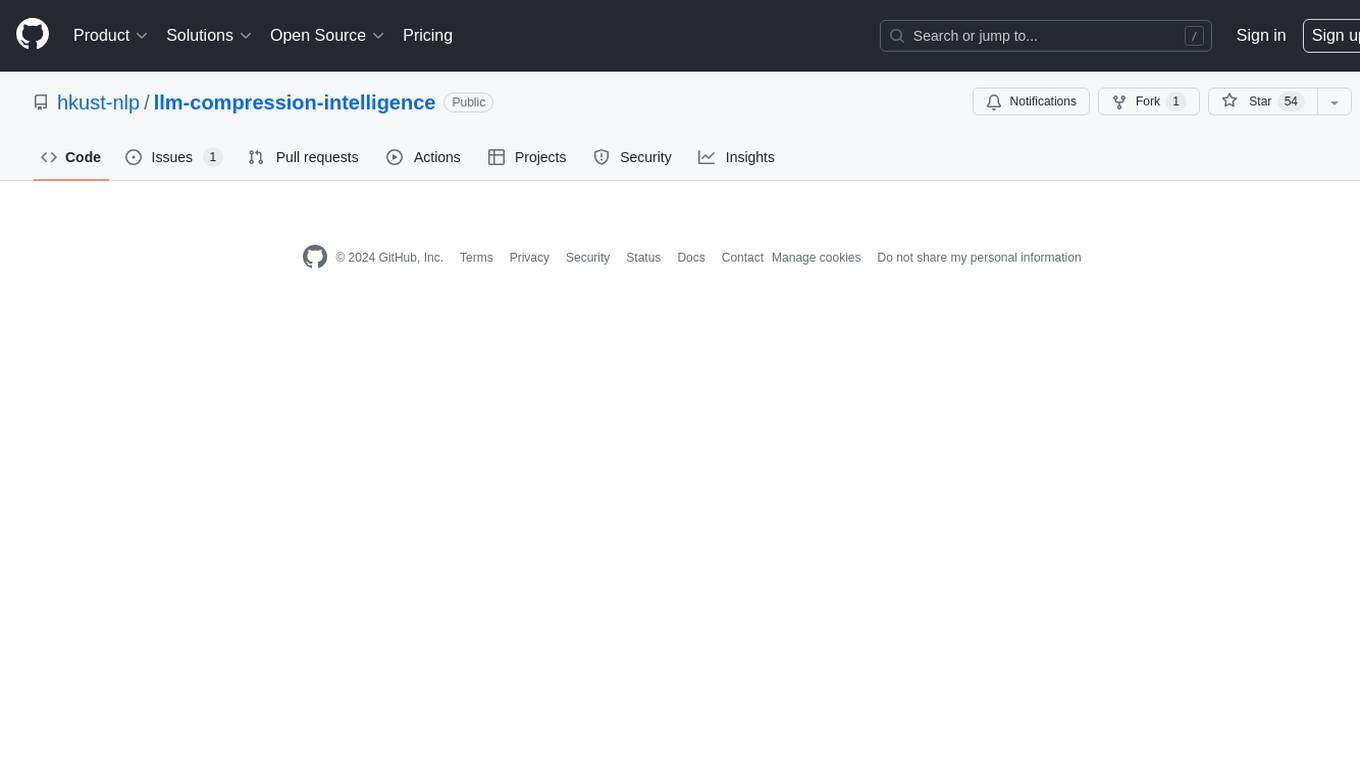
llm-compression-intelligence
This repository presents the findings of the paper "Compression Represents Intelligence Linearly". The study reveals a strong linear correlation between the intelligence of LLMs, as measured by benchmark scores, and their ability to compress external text corpora. Compression efficiency, derived from raw text corpora, serves as a reliable evaluation metric that is linearly associated with model capabilities. The repository includes the compression corpora used in the paper, code for computing compression efficiency, and data collection and processing pipelines.
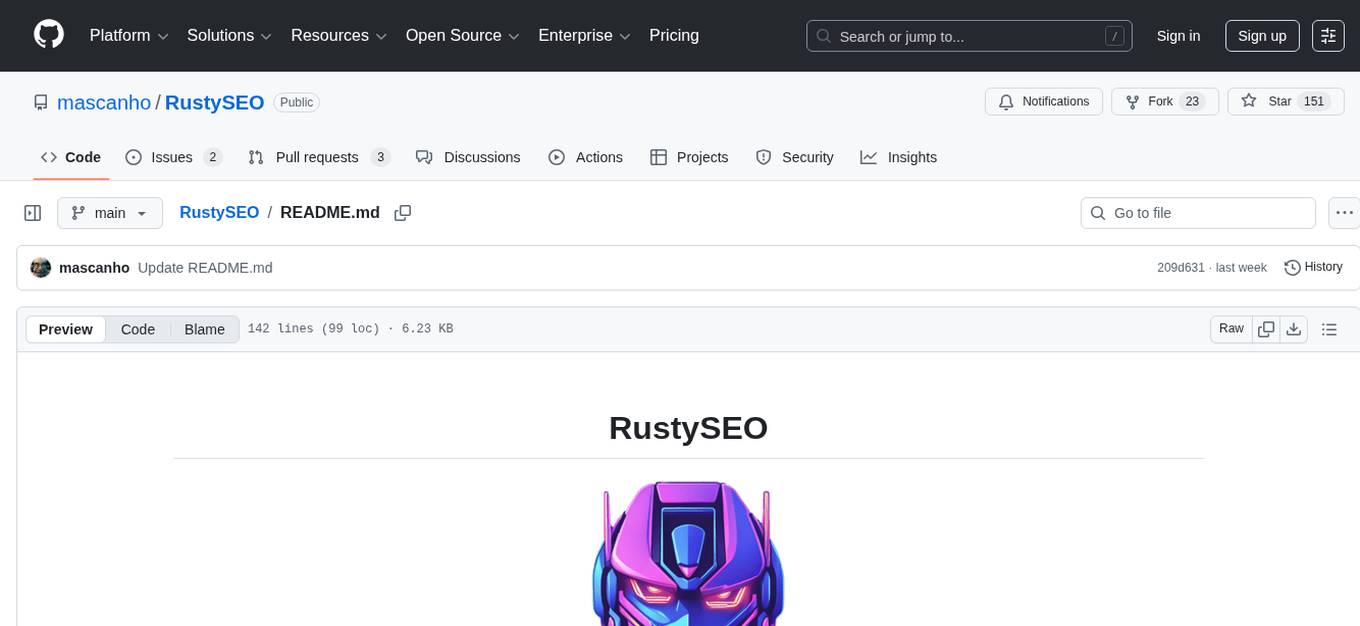
RustySEO
RustySEO is a free, modern SEO/GEO toolkit designed to help users crawl and analyze websites and server logs without crawl limits. It is an all-in-one, cross-platform marketing toolkit for comprehensive SEO & GEO analysis, providing actionable insights into marketing and SEO strategies. The tool offers features such as shallow & deep crawl, technical diagnostics, on-page SEO analysis, dashboards, reporting, topic and keyword generators, AI chatbot, crawl history, image conversion and optimization, and more. RustySEO aims to be a robust, free alternative to costly commercial SEO tools, with integrations like Google PageSpeed Insights, Google Gemini, and more.

llava-docker
This Docker image for LLaVA (Large Language and Vision Assistant) provides a convenient way to run LLaVA locally or on RunPod. LLaVA is a powerful AI tool that combines natural language processing and computer vision capabilities. With this Docker image, you can easily access LLaVA's functionalities for various tasks, including image captioning, visual question answering, text summarization, and more. The image comes pre-installed with LLaVA v1.2.0, Torch 2.1.2, xformers 0.0.23.post1, and other necessary dependencies. You can customize the model used by setting the MODEL environment variable. The image also includes a Jupyter Lab environment for interactive development and exploration. Overall, this Docker image offers a comprehensive and user-friendly platform for leveraging LLaVA's capabilities.
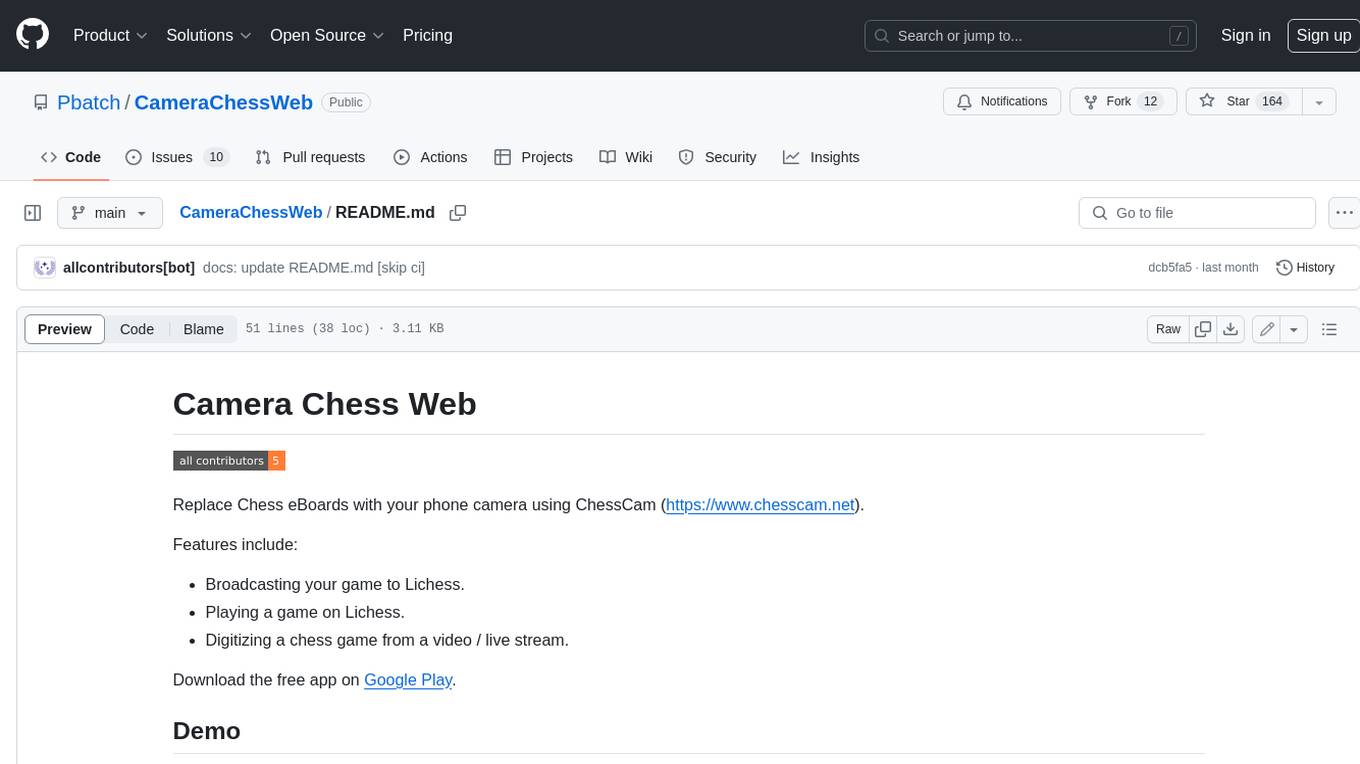
CameraChessWeb
Camera Chess Web is a tool that allows you to use your phone camera to replace chess eBoards. With Camera Chess Web, you can broadcast your game to Lichess, play a game on Lichess, or digitize a chess game from a video or live stream. Camera Chess Web is free to download on Google Play.
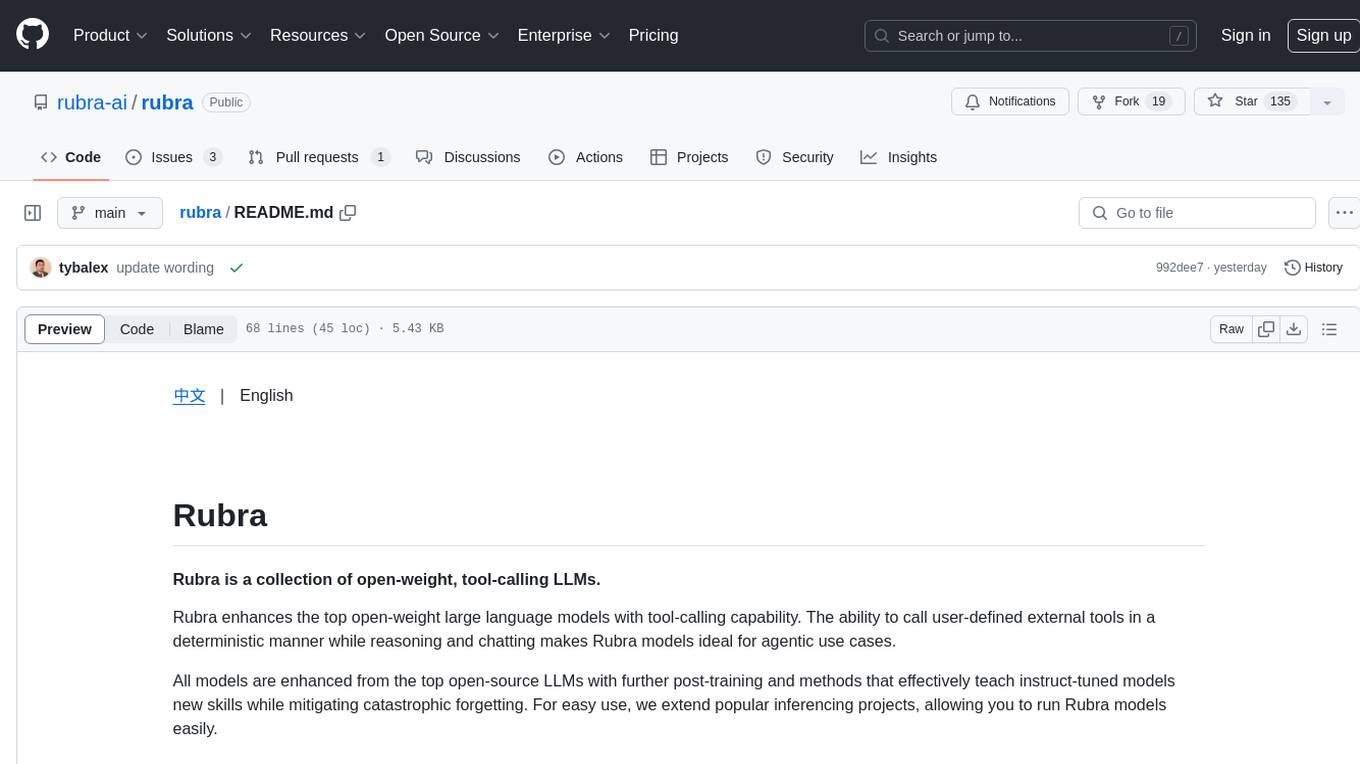
rubra
Rubra is a collection of open-weight large language models enhanced with tool-calling capability. It allows users to call user-defined external tools in a deterministic manner while reasoning and chatting, making it ideal for agentic use cases. The models are further post-trained to teach instruct-tuned models new skills and mitigate catastrophic forgetting. Rubra extends popular inferencing projects for easy use, enabling users to run the models easily.
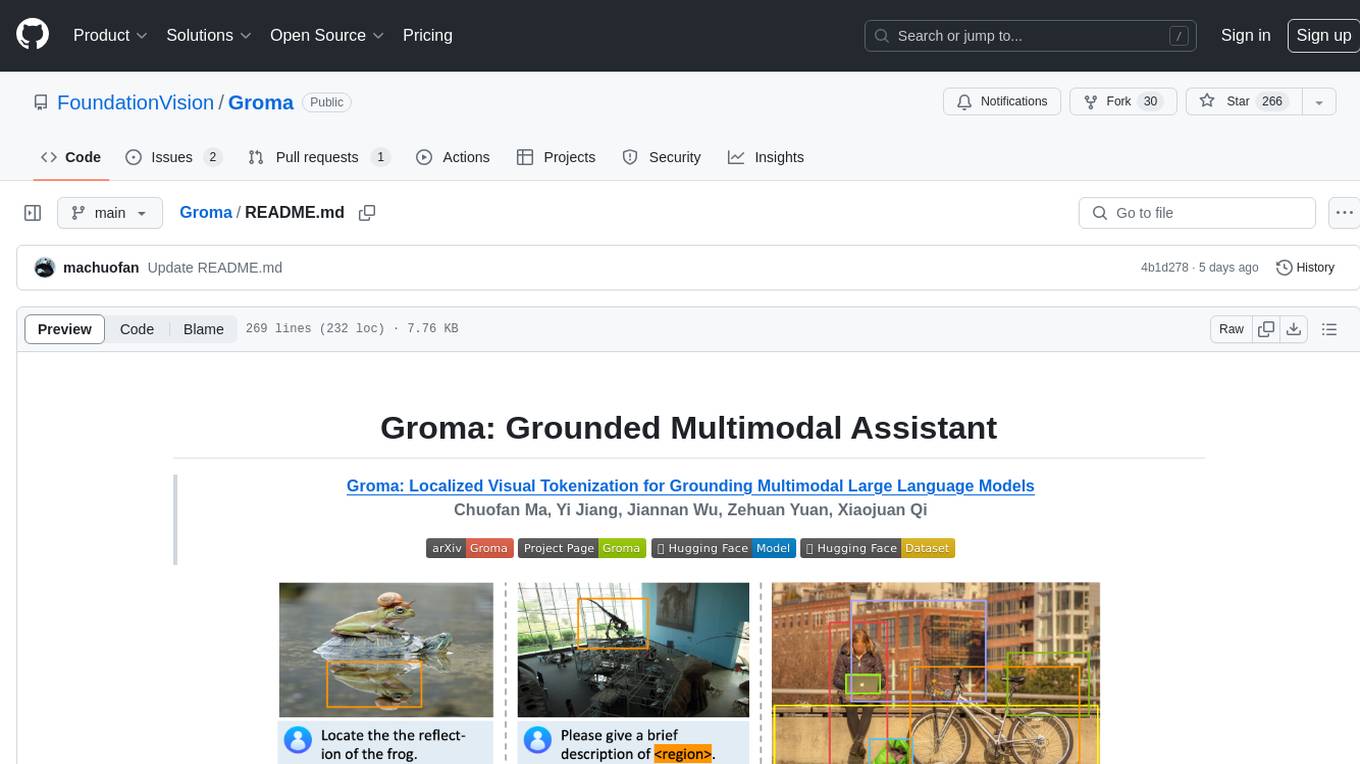
Groma
Groma is a grounded multimodal assistant that excels in region understanding and visual grounding. It can process user-defined region inputs and generate contextually grounded long-form responses. The tool presents a unique paradigm for multimodal large language models, focusing on visual tokenization for localization. Groma achieves state-of-the-art performance in referring expression comprehension benchmarks. The tool provides pretrained model weights and instructions for data preparation, training, inference, and evaluation. Users can customize training by starting from intermediate checkpoints. Groma is designed to handle tasks related to detection pretraining, alignment pretraining, instruction finetuning, instruction following, and more.
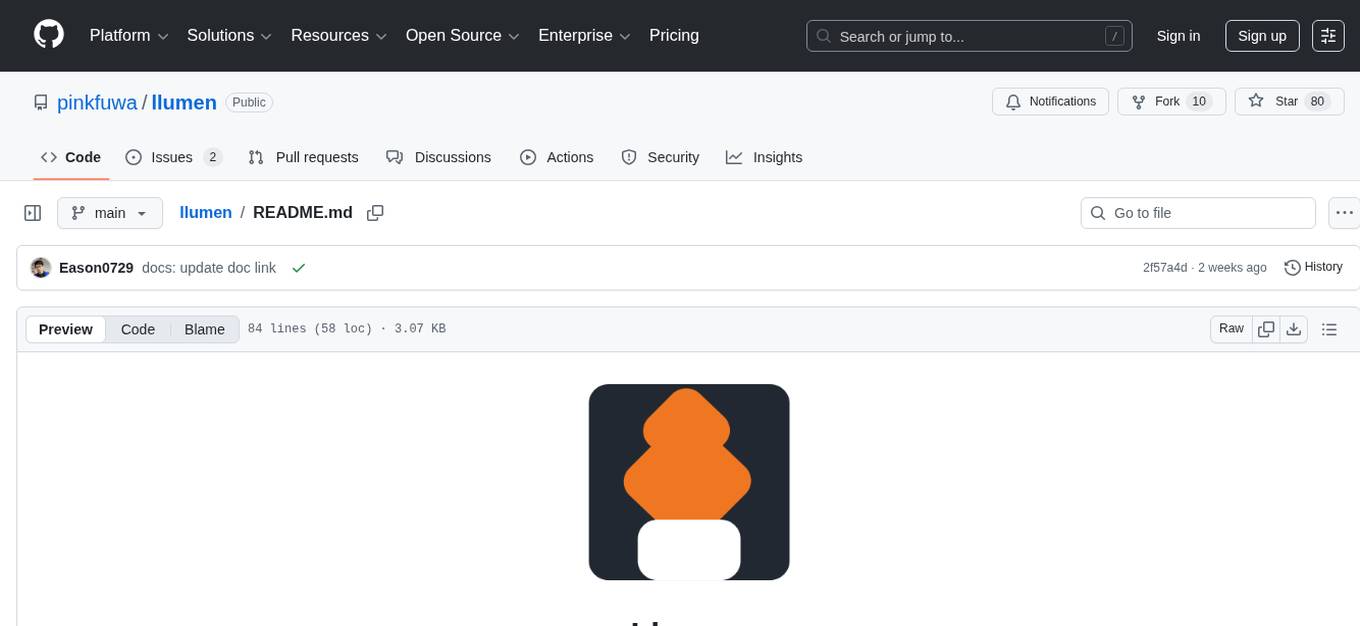
llumen
Llumen is a self-hosted interface optimized for modest hardware like Raspberry Pi, old laptops, and minimal VPS. It offers privacy without complexity, providing essential features with minimal resource demands. Users can enjoy sub-second cold starts, real-time token streaming, various chat modes, rich media support, and a universal API for OpenAI-compatible providers. The tool has a small footprint with a binary size of around 17MB and RAM usage under 128MB. Llumen aims to simplify the setup process and offer a user-friendly experience for individuals seeking a privacy-focused solution.
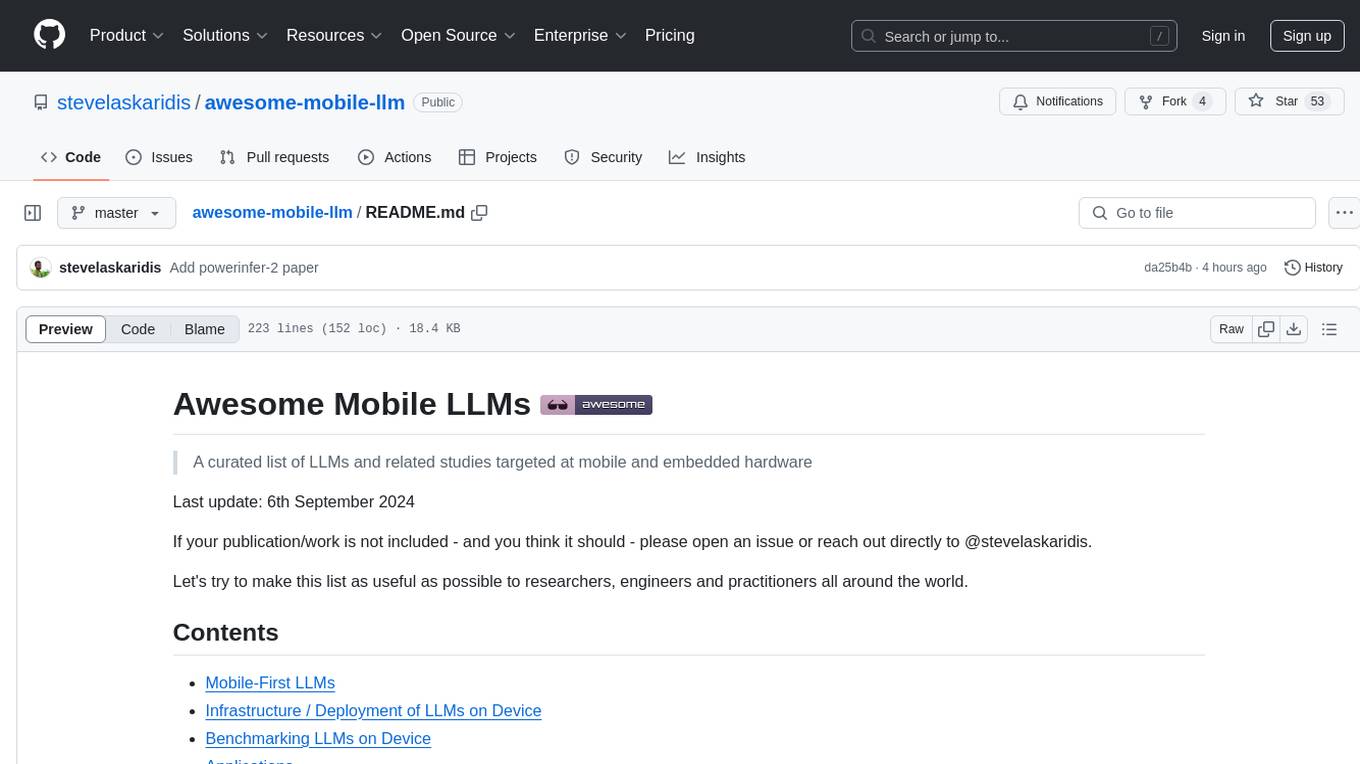
awesome-mobile-llm
Awesome Mobile LLMs is a curated list of Large Language Models (LLMs) and related studies focused on mobile and embedded hardware. The repository includes information on various LLM models, deployment frameworks, benchmarking efforts, applications, multimodal LLMs, surveys on efficient LLMs, training LLMs on device, mobile-related use-cases, industry announcements, and related repositories. It aims to be a valuable resource for researchers, engineers, and practitioners interested in mobile LLMs.
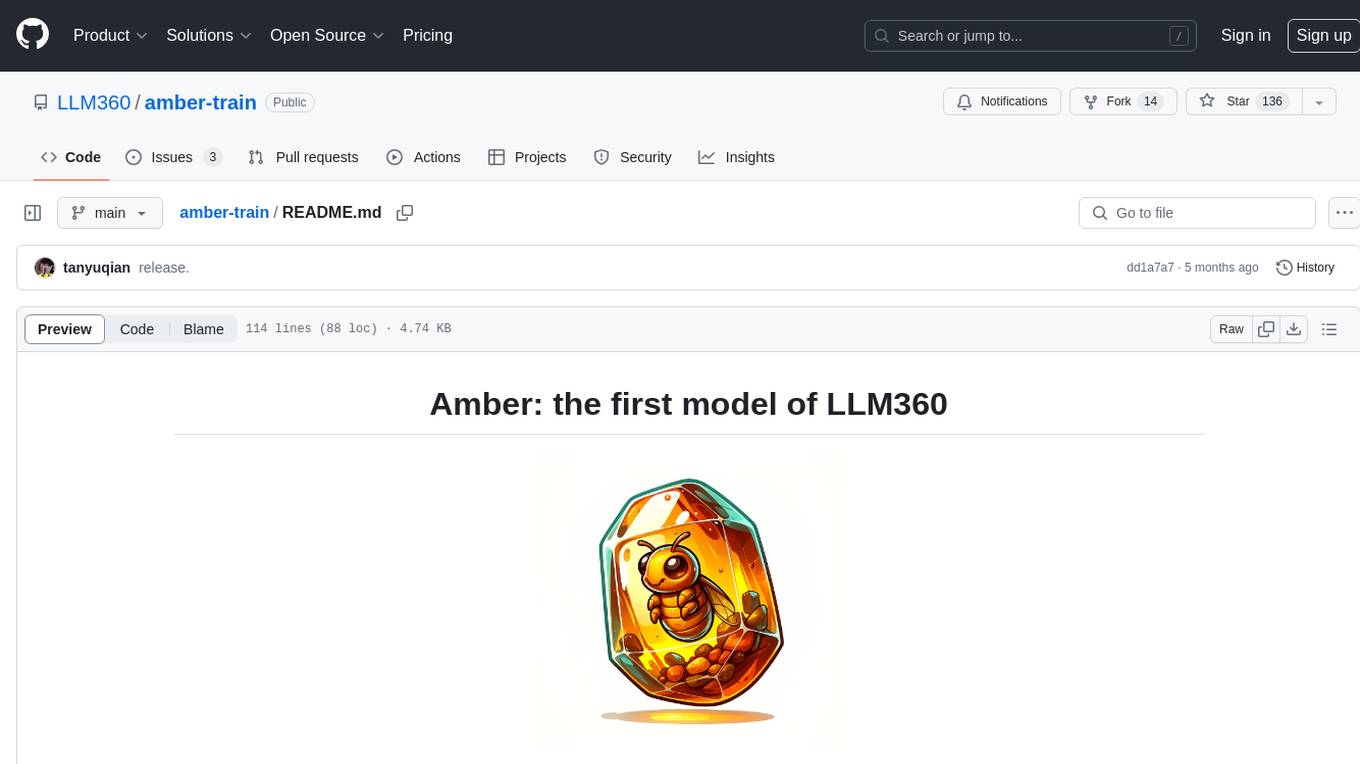
amber-train
Amber is the first model in the LLM360 family, an initiative for comprehensive and fully open-sourced LLMs. It is a 7B English language model with the LLaMA architecture. The model type is a language model with the same architecture as LLaMA-7B. It is licensed under Apache 2.0. The resources available include training code, data preparation, metrics, and fully processed Amber pretraining data. The model has been trained on various datasets like Arxiv, Book, C4, Refined-Web, StarCoder, StackExchange, and Wikipedia. The hyperparameters include a total of 6.7B parameters, hidden size of 4096, intermediate size of 11008, 32 attention heads, 32 hidden layers, RMSNorm ε of 1e^-6, max sequence length of 2048, and a vocabulary size of 32000.
For similar tasks

llm-on-openshift
This repository provides resources, demos, and recipes for working with Large Language Models (LLMs) on OpenShift using OpenShift AI or Open Data Hub. It includes instructions for deploying inference servers for LLMs, such as vLLM, Hugging Face TGI, Caikit-TGIS-Serving, and Ollama. Additionally, it offers guidance on deploying serving runtimes, such as vLLM Serving Runtime and Hugging Face Text Generation Inference, in the Single-Model Serving stack of Open Data Hub or OpenShift AI. The repository also covers vector databases that can be used as a Vector Store for Retrieval Augmented Generation (RAG) applications, including Milvus, PostgreSQL+pgvector, and Redis. Furthermore, it provides examples of inference and application usage, such as Caikit, Langchain, Langflow, and UI examples.
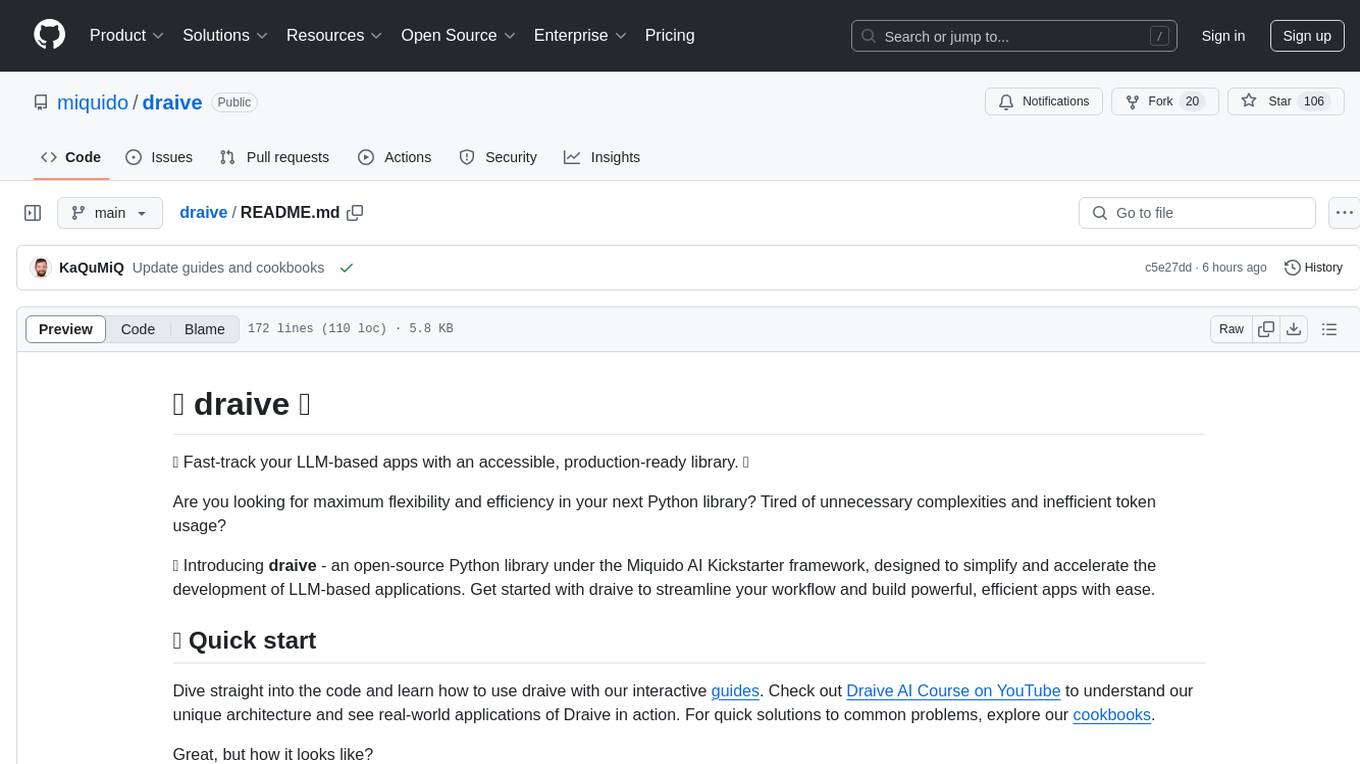
draive
draive is an open-source Python library designed to simplify and accelerate the development of LLM-based applications. It offers abstract building blocks for connecting functionalities with large language models, flexible integration with various AI solutions, and a user-friendly framework for building scalable data processing pipelines. The library follows a function-oriented design, allowing users to represent complex programs as simple functions. It also provides tools for measuring and debugging functionalities, ensuring type safety and efficient asynchronous operations for modern Python apps.

data-prep-kit
Data Prep Kit accelerates unstructured data preparation for LLM app developers. It allows developers to cleanse, transform, and enrich unstructured data for pre-training, fine-tuning, instruct-tuning LLMs, or building RAG applications. The kit provides modules for Python, Ray, and Spark runtimes, supporting Natural Language and Code data modalities. It offers a framework for custom transforms and uses Kubeflow Pipelines for workflow automation. Users can install the kit via PyPi and access a variety of transforms for data processing pipelines.
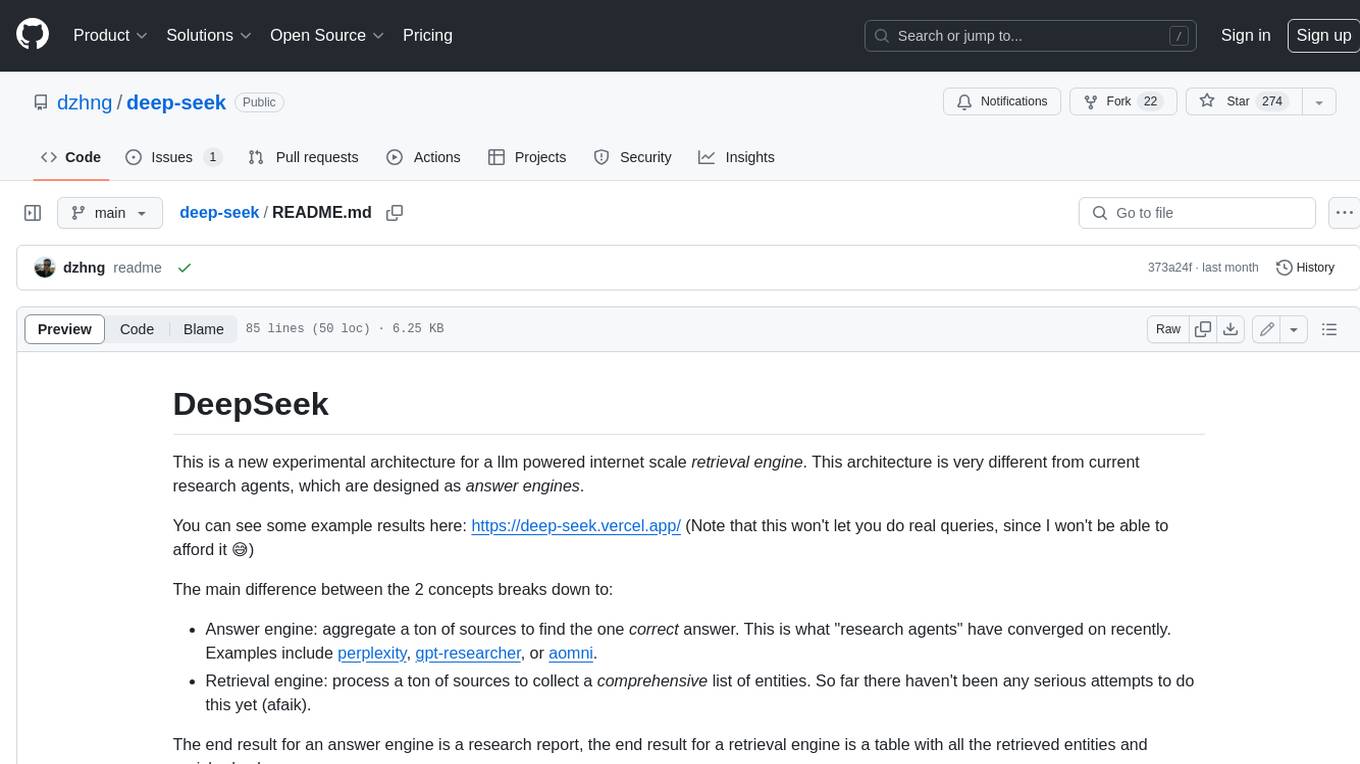
deep-seek
DeepSeek is a new experimental architecture for a large language model (LLM) powered internet-scale retrieval engine. Unlike current research agents designed as answer engines, DeepSeek aims to process a vast amount of sources to collect a comprehensive list of entities and enrich them with additional relevant data. The end result is a table with retrieved entities and enriched columns, providing a comprehensive overview of the topic. DeepSeek utilizes both standard keyword search and neural search to find relevant content, and employs an LLM to extract specific entities and their associated contents. It also includes a smaller answer agent to enrich the retrieved data, ensuring thoroughness. DeepSeek has the potential to revolutionize research and information gathering by providing a comprehensive and structured way to access information from the vastness of the internet.

mindsdb
MindsDB is a platform for customizing AI from enterprise data. You can create, serve, and fine-tune models in real-time from your database, vector store, and application data. MindsDB "enhances" SQL syntax with AI capabilities to make it accessible for developers worldwide. With MindsDB’s nearly 200 integrations, any developer can create AI customized for their purpose, faster and more securely. Their AI systems will constantly improve themselves — using companies’ own data, in real-time.
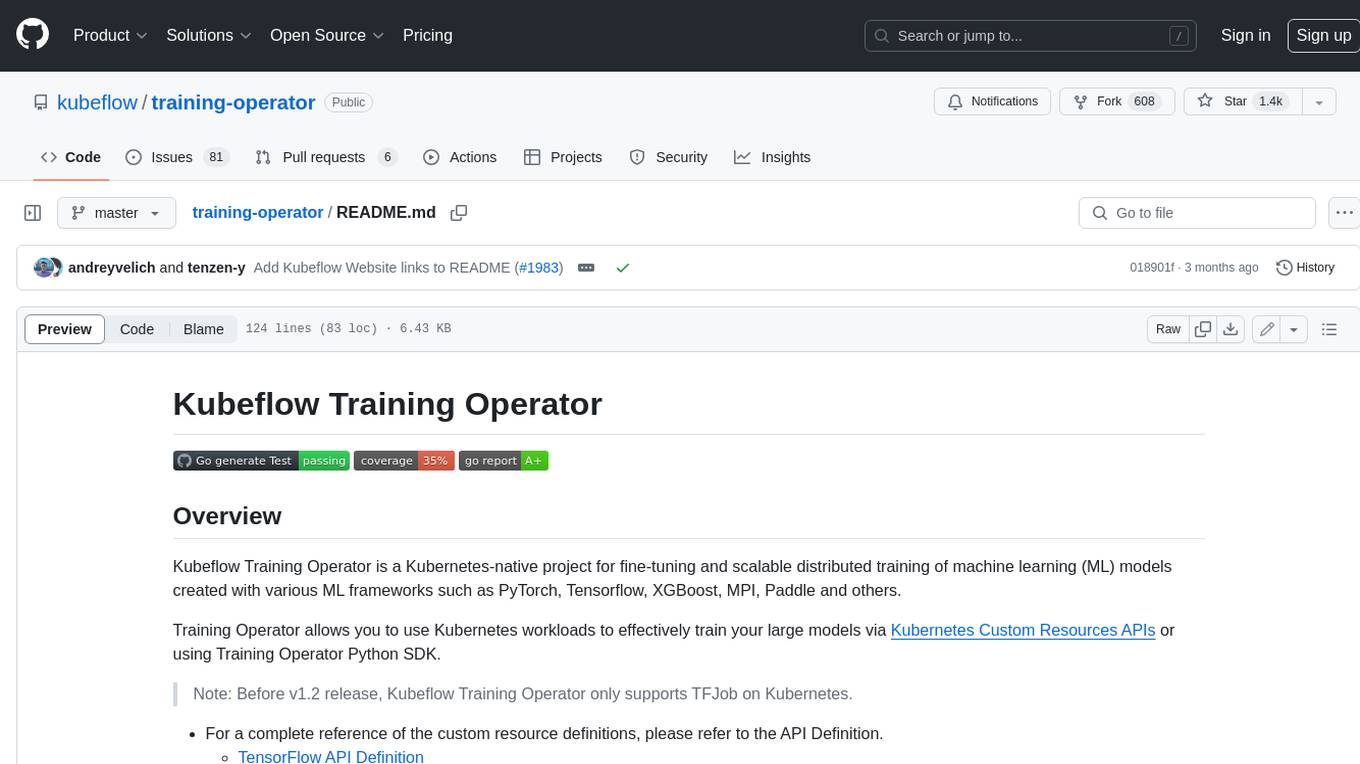
training-operator
Kubeflow Training Operator is a Kubernetes-native project for fine-tuning and scalable distributed training of machine learning (ML) models created with various ML frameworks such as PyTorch, Tensorflow, XGBoost, MPI, Paddle and others. Training Operator allows you to use Kubernetes workloads to effectively train your large models via Kubernetes Custom Resources APIs or using Training Operator Python SDK. > Note: Before v1.2 release, Kubeflow Training Operator only supports TFJob on Kubernetes. * For a complete reference of the custom resource definitions, please refer to the API Definition. * TensorFlow API Definition * PyTorch API Definition * Apache MXNet API Definition * XGBoost API Definition * MPI API Definition * PaddlePaddle API Definition * For details of all-in-one operator design, please refer to the All-in-one Kubeflow Training Operator * For details on its observability, please refer to the monitoring design doc.
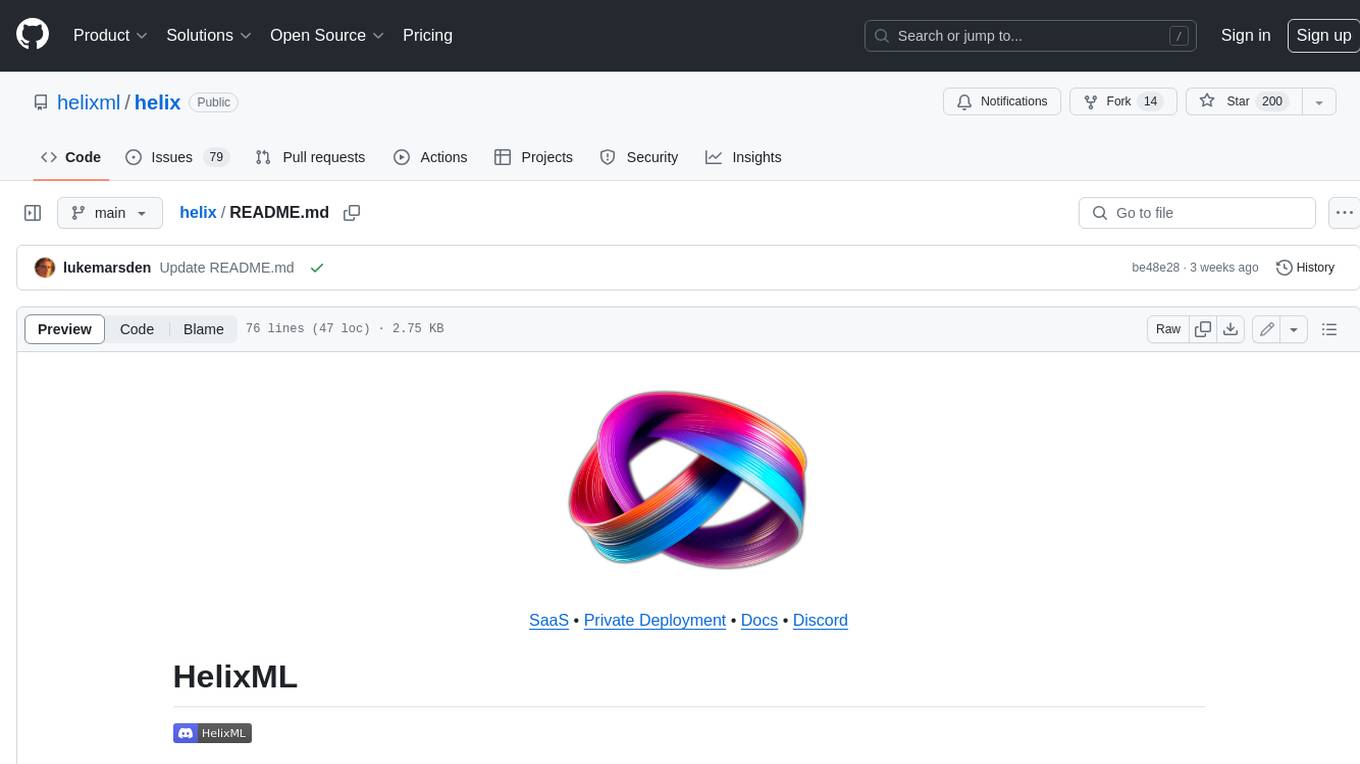
helix
HelixML is a private GenAI platform that allows users to deploy the best of open AI in their own data center or VPC while retaining complete data security and control. It includes support for fine-tuning models with drag-and-drop functionality. HelixML brings the best of open source AI to businesses in an ergonomic and scalable way, optimizing the tradeoff between GPU memory and latency.
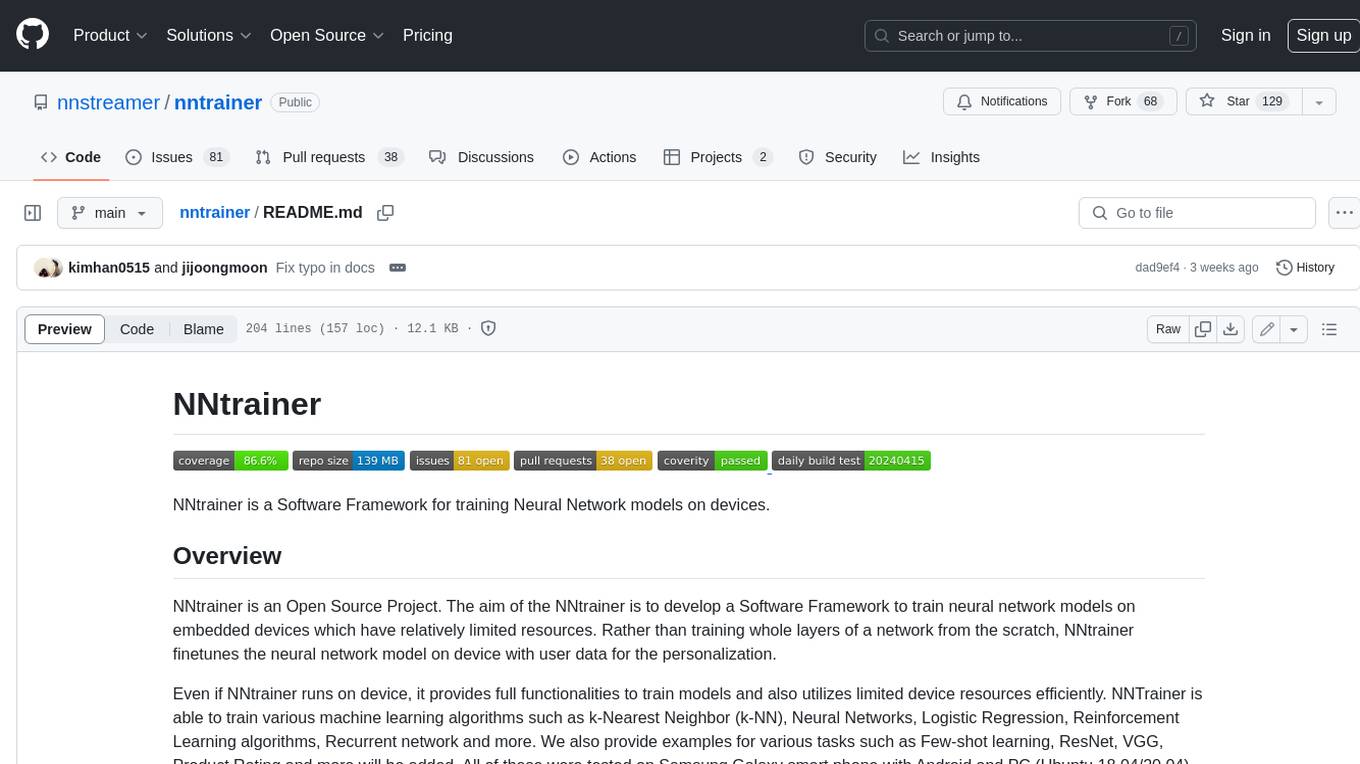
nntrainer
NNtrainer is a software framework for training neural network models on devices with limited resources. It enables on-device fine-tuning of neural networks using user data for personalization. NNtrainer supports various machine learning algorithms and provides examples for tasks such as few-shot learning, ResNet, VGG, and product rating. It is optimized for embedded devices and utilizes CBLAS and CUBLAS for accelerated calculations. NNtrainer is open source and released under the Apache License version 2.0.
For similar jobs

weave
Weave is a toolkit for developing Generative AI applications, built by Weights & Biases. With Weave, you can log and debug language model inputs, outputs, and traces; build rigorous, apples-to-apples evaluations for language model use cases; and organize all the information generated across the LLM workflow, from experimentation to evaluations to production. Weave aims to bring rigor, best-practices, and composability to the inherently experimental process of developing Generative AI software, without introducing cognitive overhead.

LLMStack
LLMStack is a no-code platform for building generative AI agents, workflows, and chatbots. It allows users to connect their own data, internal tools, and GPT-powered models without any coding experience. LLMStack can be deployed to the cloud or on-premise and can be accessed via HTTP API or triggered from Slack or Discord.

VisionCraft
The VisionCraft API is a free API for using over 100 different AI models. From images to sound.

kaito
Kaito is an operator that automates the AI/ML inference model deployment in a Kubernetes cluster. It manages large model files using container images, avoids tuning deployment parameters to fit GPU hardware by providing preset configurations, auto-provisions GPU nodes based on model requirements, and hosts large model images in the public Microsoft Container Registry (MCR) if the license allows. Using Kaito, the workflow of onboarding large AI inference models in Kubernetes is largely simplified.

PyRIT
PyRIT is an open access automation framework designed to empower security professionals and ML engineers to red team foundation models and their applications. It automates AI Red Teaming tasks to allow operators to focus on more complicated and time-consuming tasks and can also identify security harms such as misuse (e.g., malware generation, jailbreaking), and privacy harms (e.g., identity theft). The goal is to allow researchers to have a baseline of how well their model and entire inference pipeline is doing against different harm categories and to be able to compare that baseline to future iterations of their model. This allows them to have empirical data on how well their model is doing today, and detect any degradation of performance based on future improvements.

tabby
Tabby is a self-hosted AI coding assistant, offering an open-source and on-premises alternative to GitHub Copilot. It boasts several key features: * Self-contained, with no need for a DBMS or cloud service. * OpenAPI interface, easy to integrate with existing infrastructure (e.g Cloud IDE). * Supports consumer-grade GPUs.

spear
SPEAR (Simulator for Photorealistic Embodied AI Research) is a powerful tool for training embodied agents. It features 300 unique virtual indoor environments with 2,566 unique rooms and 17,234 unique objects that can be manipulated individually. Each environment is designed by a professional artist and features detailed geometry, photorealistic materials, and a unique floor plan and object layout. SPEAR is implemented as Unreal Engine assets and provides an OpenAI Gym interface for interacting with the environments via Python.

Magick
Magick is a groundbreaking visual AIDE (Artificial Intelligence Development Environment) for no-code data pipelines and multimodal agents. Magick can connect to other services and comes with nodes and templates well-suited for intelligent agents, chatbots, complex reasoning systems and realistic characters.









